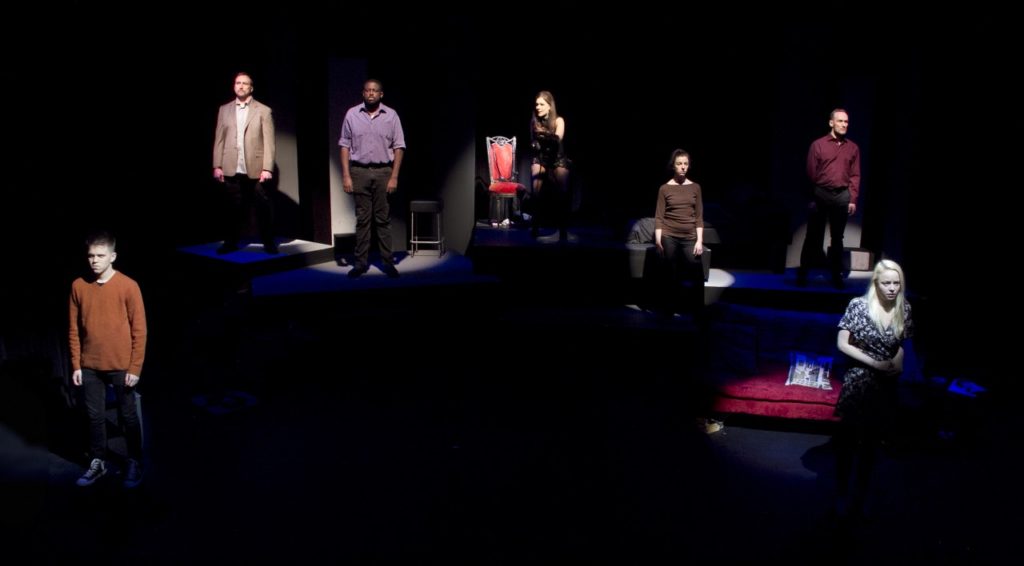Love and Human Remains: an excellent staging gives life to a dated play.

The title of the play (Love and Human Remains) by Brad Fraser written in 1989 and currently running at The Gladstone, has the advantage of being brief. However, the original title , Unidentified Human Remains and the True Nature of Love seems closer to the themes and content of this work that helped expand the international reputation of this exceptional Canadian playwrite. Thus, one wonders why author Brad Fraser discarded the original title at our present time, a title that brought his own book, part gory mystery thriller, part examination of the underlying violence implicit in the search for ones identity in a constantly fluctuating urban environment, closer to the novel American Psycho, by Bret Easton Ellis.
In fact the Canadian play preceded very closely the Easton novel that set off a movement of middle class flashy style obsession with clothes and slick dressing and expensive tastes more interested in style than in substance even if it accompanied senseless murder and cruel killing by a serial killer in Manhatten, This is touched upon very delicately by the Canadian author in a much less bloodthirsty and almost light-hearted manner.
No doubt, Fraser wanted to keep his distance from that too violent world of American psycho blood lust which was purely destructive. Thus he has created a character that links them both. The ever so slightly chilling but also playful psychic Dominatrix, Benita, complete with leathers and whips and vicious playthings, keeps us in that atmosphere of sex and drugs and psychic torment as she takes on the role of narrator, telling us about the evolution of David (the neurotic young man with his troubled family relationships) his highly sexually repressed brother Bernie, caught in a trap between his straight life and his ‘’other’ life; there is also David’s luscious blond female friend Cindy who brings him solace at tense moments when he isn’t trying to initiate the brazen and naive young Kane who doesn’t know what he wants. Cindy is also a character trying to work out her own inner confusion with her friend Robert, just as insecure as the other individuals about his own sexual preferences tinged with misogyny and repressed anti-gay reactions that would seem to reveal a boiling stew of confusion in his own subconscious. They all move through the apartment like a series of different musical themes, creating harmony and disharmony among themselves, the chaotic image of a contemporary urban society coming to grips with all its inner tensions.
After those highly theatrical performances of Priscilla Queen of the Desert, or la Cage aux Folles or the foregrounding of Ru Paul on TV which replace drag performances of all types, other forms of performances seek to naturalise a complex variety of sexual behaviours, something that comes through very well on more recent shows that suggest what Brad Fraser has already said is not new at all. In fact his ideas appear rather dated which is a shame.
What really appears most interesting is the way director Plante, set designer David Magladry, lighting designer Karl Wagner, sound designer Riley Stewart and costume designer Teal Cochrane have all concurred to navigate the creativity with the text as it is propelled into the site of a fast paced choral performance, orchestrated impeccably by director Chantale Plante. Each group is set up on a different mini stage in its own fixed area as the voices follow the flow of repeated sounds in different contexts to give the impression that the words have changed meaning as they flow back and forth from each speaking group. At those impressive moments, the narrative between characters works well but then as the narrative breaks down, the poetic moments that make the words reconnect, fall in together and create a ravishing poetry of speaking voices. Ones eyes and ears follow the voices around the stage, and the result is moments of multiple mini-concerts that flit from one space to another , filling the acting-space with spoken word performance d creating much fun and joy with the harmony of sound and the disjounted nature of the meaning of the words. In that joyous movement of voices we hear and see Bradley Sykes as David whipping around with perfect poise as a former professional dancer by twisting his body with great talent, even though he seems to overact a good part of the time, trying to create a strong presence by exaggerating his facial expressions and his physical work which is not necessary because his character is already highly theatrical.
We liked the talented young Alex Henkelman with his sullen gaze and pouty realism that sets his own stage in the middle of the action; Alexander Lemours as Robert, and Kirby Naftel as Jerri, Candy’s friends from the gymn create perfect tension around Candy which fitted in with the movement of the whole.
The most impressive presence was clearly produced by Victoria Luloff as Candy whose slight style of underacting brought much emotional strength to her role as the highly challenged young woman who cant seem to find her own way in this carnival of desires. Not only is she stunning but she reveals a great sensibility on stage and should really go on to much greater things.
Karl Wagner’s perfectly selected lighting effect, brings up mysterious lighting spaces as Riley Stewart’s sound design inscribes bits from operas which are perfectly suited to the orchestration of the collective event. Those moments were very moving!!
Toto Too did its best to navigate through what was essentially a most difficult text and the result was certainly worth the effort. All our congratulations to the whole team.
Love and Human Remains by Brad Fraser ends at the Gladstone on March 16.
A production of Toto Too Theatre at the Gladstone